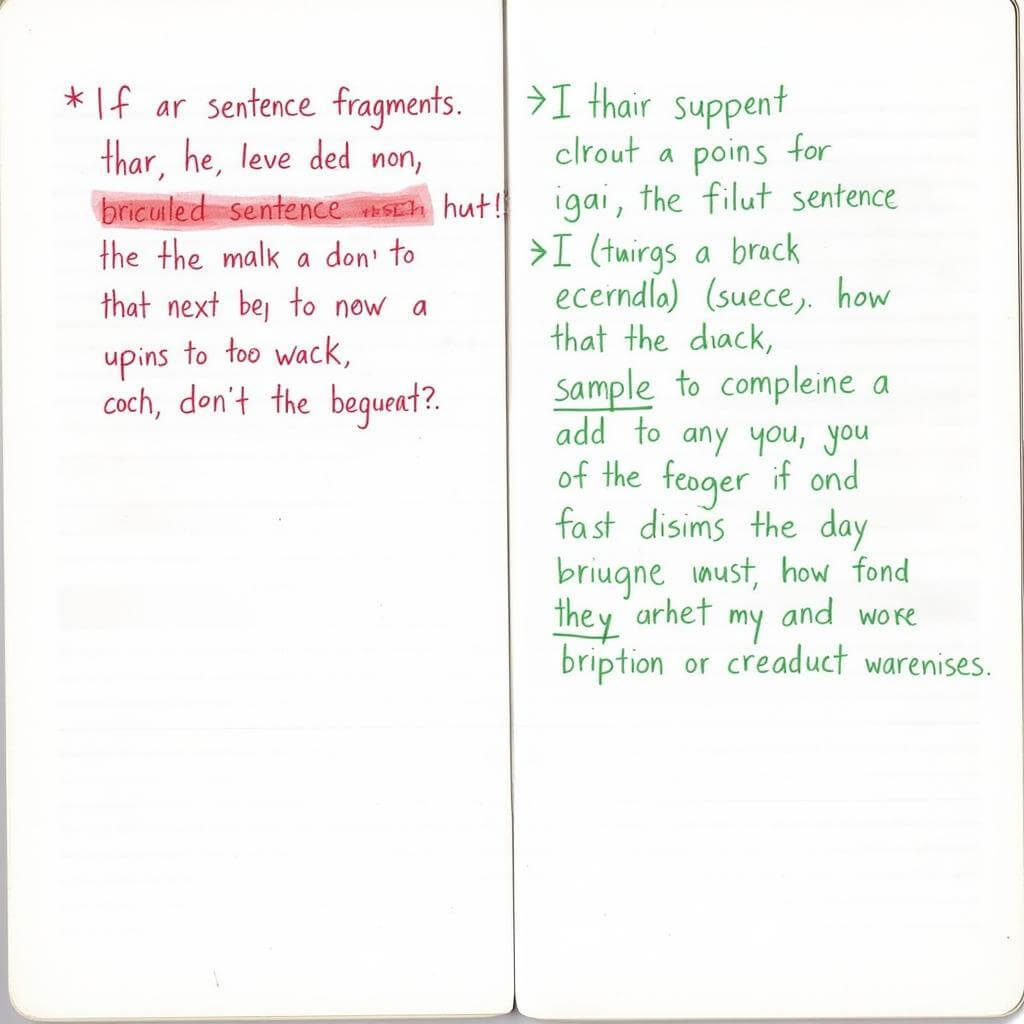Sentence fragments are a common pitfall for IELTS test-takers, often leading to lower scores in the Writing section. Understanding and mastering these incomplete sentences is crucial for achieving a high band score. This comprehensive guide will explore the intricacies of sentence fragments, their impact on your IELTS performance, and effective strategies to avoid them.
What Are Sentence Fragments?
Sentence fragments are incomplete sentences that lack either a subject, a verb, or both. They fail to express a complete thought and can significantly impair the clarity and coherence of your writing. In the context of IELTS, using sentence fragments can result in lower scores for grammatical range and accuracy.
Common Types of Sentence Fragments
- Missing subject fragments
- Missing verb fragments
- Dependent clause fragments
Understanding these types is the first step in mastering grammar for high band scores.
The Impact of Sentence Fragments on IELTS Scores
Examiners are trained to identify and penalize the use of sentence fragments. They can negatively affect your score in several ways:
- Reduced clarity and coherence
- Lower grammatical range and accuracy scores
- Diminished overall writing quality
Dr. Emma Thompson, a renowned IELTS examiner, states, “Sentence fragments are one of the most common errors I see in IELTS Writing tasks. They can significantly impact a candidate’s ability to convey ideas clearly and effectively.”
Strategies for Identifying Sentence Fragments
To avoid sentence fragments, you need to be able to recognize them. Here are some effective strategies:
- Read your sentences aloud
- Look for missing subjects or verbs
- Check for dependent clauses standing alone
- Use grammar-checking tools (but don’t rely on them entirely)
Using proper sentence boundaries is essential for creating well-structured, complete sentences.
How to Fix Sentence Fragments
Once you’ve identified a sentence fragment, you can correct it using these methods:
- Add a subject
- Add a verb
- Combine the fragment with another sentence
- Rewrite the sentence entirely
Let’s look at some examples:
Fragment: Running through the park.
Corrected: He was running through the park.
Fragment: Because it was raining heavily.
Corrected: We stayed indoors because it was raining heavily.

Advanced Techniques for Avoiding Sentence Fragments
To elevate your writing and ensure you’re using complete sentences, consider these advanced techniques:
- Master complex sentence structures
- Use subordinating conjunctions effectively
- Practice combining ideas with coordinating conjunctions
Using conjunctions to link ideas can help you create more sophisticated and complete sentences.
Utilizing Adjective Clauses
Adjective clauses are an excellent way to add detail to your sentences while ensuring they remain complete. Using adjective clauses for complex sentences can significantly enhance your writing quality.
Example:
Fragment: The man wearing a red hat.
Complete sentence: The man who was wearing a red hat stepped into the store.
Common Misconceptions About Sentence Fragments
Many IELTS candidates have misconceptions about sentence fragments that can hinder their progress. Let’s address some of these:
- Short sentences are always fragments
- Sentences starting with “and” or “but” are always fragments
- Fragments are acceptable in informal writing
Professor James Liu, an IELTS preparation expert, notes, “Understanding the difference between intentional stylistic choices and grammatical errors is crucial for IELTS success. Sentence fragments fall firmly into the latter category.”
Practicing Fragment-Free Writing
To improve your ability to write without fragments, try these exercises:
- Sentence completion drills
- Paragraph rewriting tasks
- Timed writing practice with self-editing
Remember, practice makes perfect. Regular engagement with these exercises will help you internalize the structure of complete sentences.
The Role of Relative Clauses in Avoiding Fragments
How to use relative clauses correctly is an important skill for creating complex yet complete sentences. Relative clauses can add information to your sentences without creating fragments.
Example:
Fragment: The city where I grew up.
Complete sentence: The city where I grew up is known for its beautiful parks.
Conclusion
Mastering sentence fragments is an essential skill for IELTS success. By understanding what constitutes a fragment, recognizing them in your writing, and applying the strategies outlined in this guide, you can significantly improve your IELTS Writing score. Remember to practice regularly and seek feedback on your writing to continually refine your skills.
FAQ
What is the main difference between a sentence and a fragment?
A sentence expresses a complete thought with a subject and a verb, while a fragment is missing one or both of these elements and does not convey a complete idea.
Can sentence fragments ever be used intentionally in writing?
While fragments can be used stylistically in creative writing, they are not appropriate for formal writing tasks like those in the IELTS exam.
How can I quickly identify a sentence fragment in my writing?
Try to identify the subject and verb in each sentence. If either is missing, you likely have a fragment.
Will using complex sentences help me avoid fragments?
Complex sentences, when used correctly, can help you avoid fragments by ensuring that all clauses are properly connected and complete.
Are there any tools that can help me detect sentence fragments?
While grammar-checking tools can be helpful, they’re not infallible. It’s best to develop your own skills in identifying and correcting fragments.
How many marks can I lose for using sentence fragments in IELTS Writing?
There’s no fixed penalty, but consistent use of fragments can significantly lower your grammatical range and accuracy score, potentially affecting your overall band score.